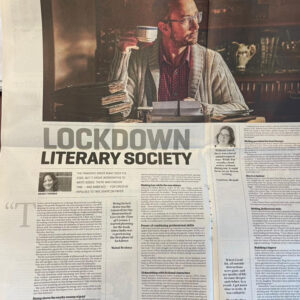The pandemic drove many over the edge, but it drove wordsmiths to write books. There was enough time — and ambience — for creative impulses to take shape on paper
Anjaly Thomas
“The first animal that greets me in Hwange National Park is an old fox dragging his feet past the dying bush. My maternal instincts kick in. I am all for adopting the animal and nursing it back to life. The safari driver reading the female mind all too well cleverly changes tracks and heads straight to a clearing where kudus frolic in the morning sun. A sight as heartwarming as that put the dying fox out of my mind. I brighten up suddenly.”
…so reads an extract from my upcoming book, A Roar and A Drumbeat. But when the world shut down, I felt like that fox in Zimbabwe, for nothing could drive home the feeling of powerlessness and frustrations for a travel writer, than the memories of heroic journeys into the African wild. Not wanting to let the lockdown frustration tell on me, I decided to write down my experiences in the wild. It was also a way to feel alive. And free.
Of course, as only writers will understand, there were lapses in memory. Lockdown and its related uncertainties stood in the way of a clear and functioning mind and I was often forced to twist my tale to reflect the contrast of a life in and before the global shutdown.
There were setbacks too. Sometimes, my artistry came to a despairing halt. I couldn’t tell the difference between eland and kudu. Days blurred. I was defenseless against the Covid gloom. I found myself staring at the blank screen, paralysed for lack of words. Clearly, writing was not always the way out in a pandemic situation.
Rising above the murky swamp of grief
Boston-based author Marci Darling tapped into her life experiences, successfully wrote and published two of her works during lockdown. Her books, Champagne Scandal and Divorce Diva were published in June and December 2020 respectively.
She is currently on her third book. For Marci, writing was cathartic.




